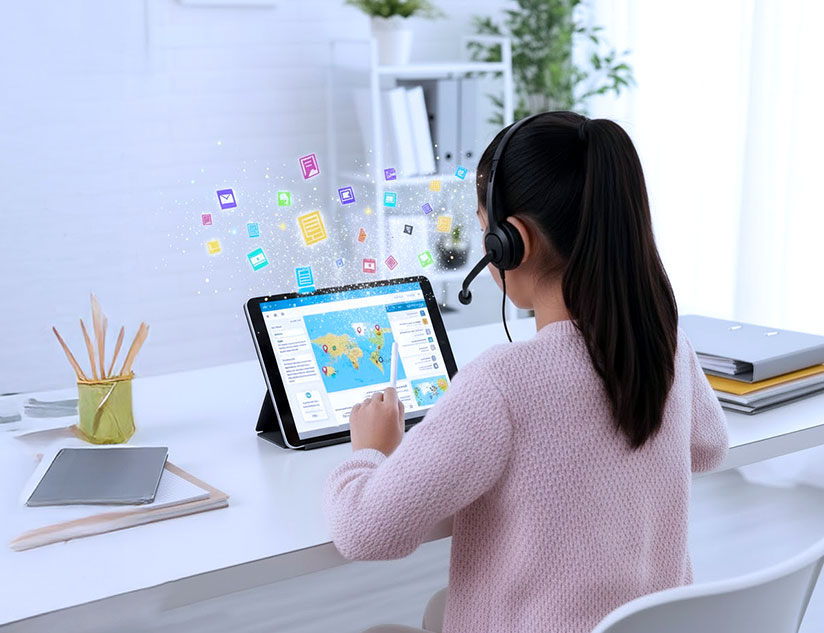Language learning technology is a strategic application of language labs, multimedia, end-user devices, audio/visual content, and digital education pedagogy. Since teachers play the most critical role in facilitating education, empowering them to improve the language learning experiences of online learners is crucial. The common goal of language educators and language learning technology providers is to facilitate more natural, comprehensive, and quick language progression.
The global language learning market size is projected to expand at a CAGR of 18.8% between 2022 and 2028 to reach $28.5 billion by 2028. According to the World Bank, not training and engaging teachers in edtech can impact learning outcomes. There is a need to reimagine human connections through technology and become facilitators of learning. Designing pedagogical models is necessary to empower teachers to perform their jobs well and enhance student learning outcomes.
Challenges Online Language Teachers Face
Language educators and online teachers, in general, face some common challenges in classroom and assessment management.
Maintaining Attendance
With anytime-anywhere learning facilities, class schedules have become flexible. Often, students view only recorded sessions instead of being present for the live ones. This may be due to time-zone differences, students’ learning preferences, or accessibility of the Internet or a device. Maintaining attendance manually is tedious in such scenarios.
Fostering Collaboration
The physical distance between students and teachers diminishes the opportunities for peer interaction, group projects, and combined studies. Time-zone differences further hinder one-on-one teacher-student interactions. Interpersonal communication is a crucial aspect of language education, and failure to facilitate such communication could impact learning outcomes.
Assessment Management
With education becoming increasingly globalized, traditional assessment methods have limited efficacy. Verbal and listening proficiency are not effectively assessed, leaving an essential aspect of language learning unaddressed. This is because teachers’ time is occupied by administering and grading written assessments, which are insufficient parameters of learning achievement for languages.
Therefore, education platforms must take on repetitive and mechanical tasks, freeing up time for educators. The good news is that edtech platforms are equipped to do so. Here’s how.
How Modern EdTech Solutions Address These Challenges
EdTech platforms have evolved into effective tools to eliminate teaching challenges for language educators. They are equipped with various tools to:
Manage Attendance and Track Learner Progress
Digital learning platforms eliminate the need for teachers to track student participation in live, recorded, or resource-based courses. The platform maintains Student attendance based on student activity and time spent on each activity. Tracking courses completed, hours spent, and assignment progress is all automated. Teachers can get reports per student and class-wise to analyze student engagement levels and learning progress. An additional benefit of these reports is that educators can identify areas where greater support might be needed. These insights can help teachers improve instruction for different student levels.
Facilitate Collaboration and Communication
EdTech platforms offer a variety of communication and collaboration features. Video and audio conferencing facilities are great for conducting live group discussions. Modern language learning solutions are also equipped with messaging and discussion forums, allowing learners to collaborate and express themselves. In addition, gamification and leaderboard-based challenges keep students engaged and instill a competitive spirit and a sense of achievement.
Manage Assignment and Resource Access
Since all resources are digital and teachers’ sessions are recorded, students can be granted access automatically, according to their progress along a learning module. Access to all resources, such as recorded sessions, learning materials, assignments, and supplementary learning resources, is controlled via automated resource and access management subsystems. This takes the gigantic task of making learning content accessible to learners off a teacher’s task list, enabling them to focus on pedagogy and learning material quality.
Expedite Assessments and Grading
NLP-powered assessment automation takes care of the massive task of checking grammar, spelling, comprehension, etc. Video assessments and feedback play a critical role in teachers assessing students’ spoken and listening skills. Digital assessment toolkits dynamically set assessment parameters based on individual learning goals. In addition, automated feedback and suggestions for improvement allow students to attain learning milestones without delays. This reduces learning gaps without burdening teachers. Additionally, easily generated assessment reports empower teachers to create personalized learning paths and custom assessments based on the strengths and weaknesses of individual students.
Advancements in technology have opened new avenues to make language learning more accessible for learners worldwide. The latest edtech tools are more aligned with empowering teachers to facilitate efficient language education. Educators must identify their requirements and choose the best solution to their needs to facilitate language learning effectively. MagicBox™ is a cutting-edge edtech solutions provider with rich features to support classroom management, streamline assessments, and facilitate collaboration. The platform leverages the latest technology to enhance teaching and learning experiences. Schedule a demo now to learn how you can power up language education with AI-driven solutions.















